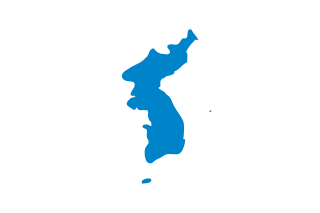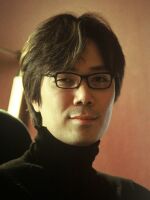So-young is a Korean feminine given name. Its meaning differs based on the hanja used to write each syllable of the name. There are 45 hanja with the reading "so" and 34 hanja with the reading "young" on the South Korean government's official list of hanja which may be registered for use in given names.
Shin-young, also spelled Shin-yong or Sin-young, is a Korean unisex given name. Its meaning depends on the hanja used to write each syllable of the name. There are 25 hanja with the reading "shin" and 34 hanja with the reading "young" on the South Korean government's official list of hanja which may be registered for use in given names.
Mi-young, also spelled Mee-young or Mi-yong, is a Korean feminine given name. It was the seventh-most popular name for newborn girls in South Korea in 1960, falling to tenth place by 1970.
Young-min is a Korean masculine given name. Its meaning depends on the hanja used to write each syllable of the name. There are 34 hanja with the reading "young" and 27 hanja with the reading "min" on the South Korean government's official list of hanja which may be registered for use in given names.
Young-sik, also spelled Young-shik or Yong-sik, is a Korean masculine given name. Its meaning differs based on the hanja used to write each syllable of the name. There are 34 hanja with the reading "young" and 16 hanja with the reading "sik" on the South Korean government's official list of hanja which may be registered for use in given names. According to South Korean government data, Young-sik was the sixth-most popular name for baby boys in 1940, falling to seventh place in 1950.
Young-chul, also spelled as Yeong-cheol, or in North Korea as Yong-chol, is a Korean masculine given name. The meaning differs based on the hanja used to write each syllable of the name. There are 34 hanja with the reading "young" and 11 hanja with the reading "chul" on the South Korean government's official list of hanja which may be used in given names. According to South Korean government data, it was the eighth-most popular name for baby boys born in 1940, rising to fourth place by 1950.
Min-woo is a Korean masculine given name. Its meaning depends on the hanja used to write each syllable of the name. There are 27 hanja with the reading "min" and 41 hanja with the reading "woo" on the South Korean government's official list of hanja which may be registered for use in given names.
Young-hee, also spelled Young-hi, Yong-hui or Yong-hi, is a Korean unisex given name. The meaning differs based on the hanja used to write each syllable of the given name. There are 34 hanja with the reading "young" and 25 hanja with the reading "hee" on the South Korean government's official list of hanja which may be used in given names. Young-hee was the third-most popular name for newborn girls in South Korea in 1950, falling to ninth place by 1960.
Young-ho, also spelled Yong-ho, is a Korean masculine given name. The meaning differs based on the hanja used to write each syllable of the name. There are 34 hanja with the reading "young" and 49 hanja with the reading "ho" on the South Korean government's official list of hanja which may be used in given names. Young-ho was a highly popular name in the mid-20th century: according to South Korean government data, it was the most common name for newborn boys in 1940, falling to second place by 1950 and third place in 1960.
Young-soo, also spelled Young-su or Yeong-su, is a Korean unisex given name. Its meaning depends on the hanja used to write each syllable of the name. There are 34 hanja with the reading "young" and 67 hanja with the reading "soo" on the South Korean government's official list of hanja which may be registered for use in given names. It was the second-most popular name for newborn boys in South Korea in 1960; this was part of a broader trend of giving boys names starting with the element "young" in the 1940s through the 1960s.
Hyun-jin, also spelled Hyeon-jin or Hyon-jin, is a Korean unisex given name. Its meaning depends on the hanja used to write each syllable of the name. There are 35 hanja with the reading "hyun" and 43 hanja with the reading "jin" on the South Korean government's official list of hanja which may be registered for use in given names.
Young-joo, also spelled Young-ju, Yong-joo, or Yong-ju, is a Korean unisex given name. Its meaning depends on the hanja used to write each syllable of the name. There are 34 hanja with the reading "young" and 56 hanja with the reading "joo" on the South Korean government's official list of hanja which may be registered for use in given names.
Young-jae, also spelled Yeong-jae or Yong-jae, is a Korean masculine given name. Its meaning differs based on the hanja used to write each syllable of the name. There are 34 hanja with the reading "young" and 20 hanja with the reading "jae" on the South Korean government's official list of hanja which may be used in given names.
Se-young, also spelled Sei-young, Se-yeong or Se-yong, is a Korean unisex given name. Its meaning depends on the hanja used to write each syllable of the name. There are 15 hanja with the reading "se" and 34 hanja with the reading "young" on the South Korean government's official list of hanja which may be used in given names.
Yong is a Korean family name, as well as a character in some Korean given names. As a family name, it may also be spelled Ryong.
Ki-young, also spelled Ki-yong or Gi-young, is a Korean masculine given name. Its meaning differs based on the hanja used to write each syllable of the name. There are 68 hanja with the reading "ki" and 33 hanja with the reading "young" on the South Korean government's official list of hanja which may be registered for use in given names.
Yeong-jun, also spelled Yeong-joon, Young-jun, Young-joon, or in North Korea Yong-jun, is a Korean masculine given name. Its meaning differs based on the hanja used to write each syllable of the name. There are 34 hanja with the reading "yeong" and 34 hanja with the reading "jun" on the South Korean government's official list of hanja which may be registered for use in given names.
Yeong-ok, also spelled Young-ok or Yong-ok, is a Korean female given name. Its meaning differs based on the hanja used to write each syllable of the name. There are 34 hanja with the reading "yeong" and five hanja with the reading "ok" on the South Korean government's official list of hanja which may be registered for use in given names.
Tae-yong is a Korean masculine given name. Its meaning differs based on the hanja used to write each syllable of the name. There are 20 hanja with the reading "tae" and 24 hanja with the reading "yong" on the South Korean government's official list of hanja which may be registered for use in given names. Additionally, there is one character with the reading "ryong" which may also be written and pronounced "yong" in South Korea.
Hye-young, also spelled Hye-yeong or Hye-yong, is a Korean feminine given name. Its meaning differs based on the hanja used to write each syllable of the name. There are 16 hanja with the reading "hye" and 34 hanja with the reading "young" on the South Korean government's official list of hanja which may be registered for use in given names.



